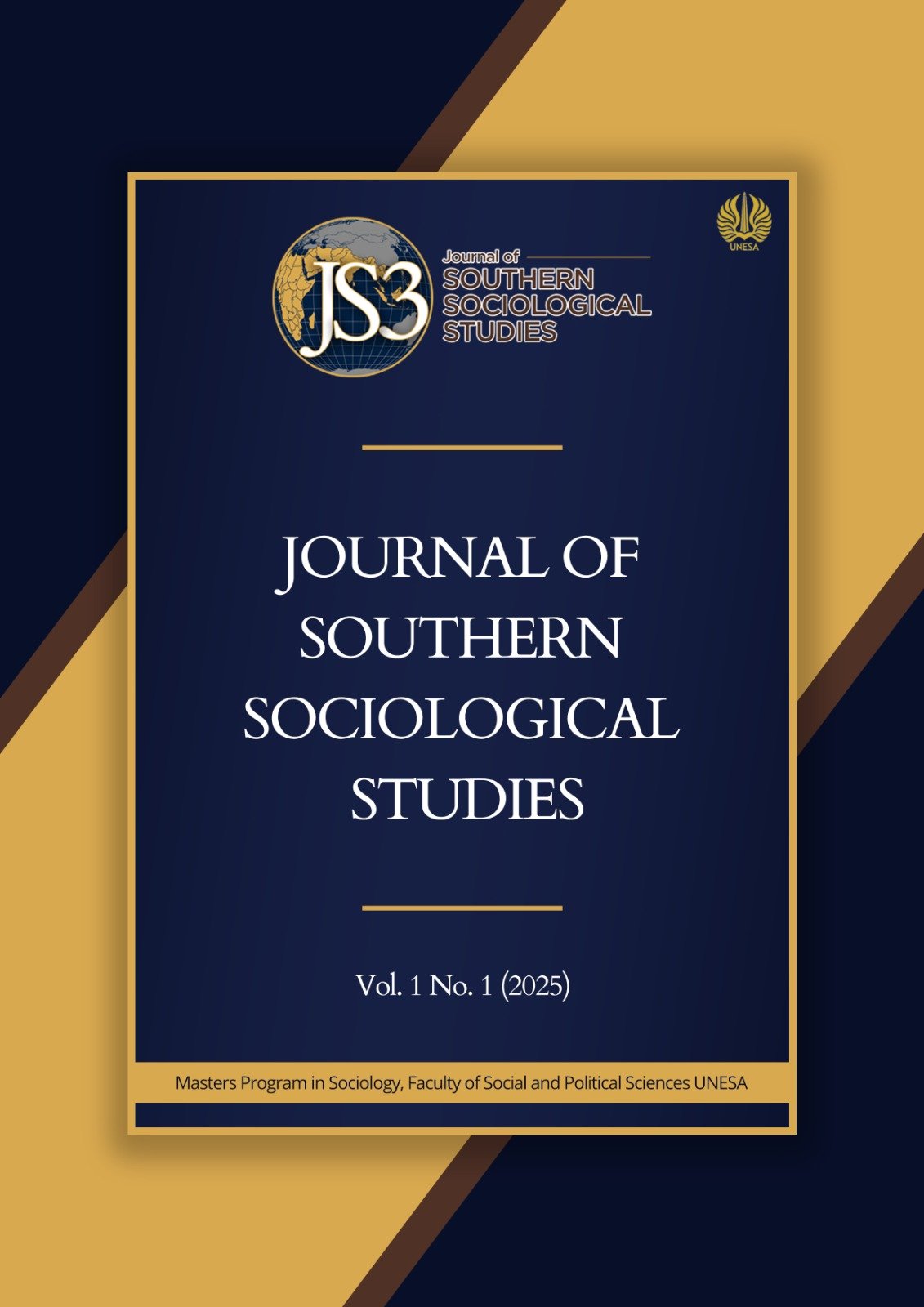The Digital Social Capital and GIG Economy Participation on The Level of Online Consumption of Students in Surabaya
DOI:
https://doi.org/10.26740/jsss.v1i1.40857Keywords:
digital social capital; GIG Economy; online consumptionAbstract
The digital revolution has ushered in profound changes across social and economic landscapes worldwide, with especially significant impacts in the rapidly urbanizing contexts of the Global South. In these regions, digital platforms have become central to reshaping not only economic activities but also the fabric of social relationships and consumption patterns. In cities such as Surabaya, Indonesia, these changes are particularly salient among university students, a demographic that navigates the intersections of education, labor precarity, and digital connectivity. The study examines the interplay between digital social capital and gig economy participation to understand their combined influence on online consumption behaviors among students in Surabaya. Quantitative methods were used in this study, with 70 respondents, measured using a 5-point Likert scale through a questionnaire instrument that had been tested for validity and reliability. The results of this study indicate that both digital social capital and gig economy participation are important factors that influence online consumption behavior of students in Surabaya, both partially and simultaneously. It shows how digital transformation is not only changing consumption patterns, but also how social capital is built and utilized and how new forms of work are emerging in developing countries.
References
Aloisi, A. 2016. Platform work, labour and the sharing economy. Ephemera: Theory & Politics in Organization, 16(4), 785-815.
Asian Development Bank. 2021. Harnessing Digital Technologies for Economic Inclusion in Asia and the Pacific. Asian Development Bank.
Atmaja, R., and Maryani, M. 2020. “Analisis perilaku konsumtif dan daya beli konsumen terhadap penjualan online selama masa pandemi COVID-19”. Jurnal Ilmu Ekonomi dan Bisnis Islam, 4(1), 15-25.
Balaram, B., Warden, J., and Wallace-Stephens, F. 2017. Good Gigs: A fairer future for the UK’s gig economy. RSA Report.
Berg, J. 2016. “Income security in the on-demand economy: Findings and policy lessons from a survey of crowdworkers”. Comparative Labor Law & Policy Journal, 37(3), 543-576.
Botsman, R., and Rogers, R. 2010. What’s Mine Is Yours: The Rise of Collaborative Consumption.
Bourdieu, P. 1984. Distinction: A Social Critique of the Judgement of Taste. Harvard University Press.
Burt, R. S. 2000. The network structure of social capital. Research in Organizational Behavior, 22, 345-423.
De Stefano, V. 2016. The rise of the “just-in-time workforce”: On-demand work, crowdwork and labor protection in the “gig-economy”. Comparative Labor Law & Policy Journal, 37, 471.
Cohen, P., Sabel, C., and Benassi, M. 2016. The Gig Economy and the Future of Work. New York Times.
De Stefano, V. 2016. The rise of the ‘gig’ economy and the challenge to employment law. Comparative Labor Law & Policy Journal, 37(3), 471-505.
De Stefano, V. 2016. The rise of the “just-in-time workforce”: On-demand work, crowdwork and labour protection in the “gig-economy”. Comparative Labor Law & Policy Journal, 37(3), 471-504.
Ellison, N. B., Steinfield, C., and Lampe, C. 2007. The benefits of Facebook “friends:” Social capital and college students’ use of online social network sites. Journal of Computer-Mediated Communication, 12(4), 1143-1168.
Friedman, G. 2014. Workers without employers: shadow corporations and the rise of the gig economy. Review of Keynesian Economics, 2(2), 171-188.
Granovetter, M. 1973. The strength of weak ties. American Journal of Sociology, 78(6), 1360-1380.
Hwang, J., and Kim, Y. 2020. Understanding the role of digital platforms in shaping consumption patterns: Implications for the gig economy. International Journal of Consumer Studies, 44(2), 114-123.
Kalleberg, A. L., and Dunn, M. 2016. "Good Jobs, Bad Jobs in the Gig Economy". Perspectives on Work, 20, 10-14.
Katadata Insight Center and Kredivo. 2020. “Perilaku konsumen dalam berbelanja di tengah era digital selama pandemi COVID-19”. Riset Research. Retrieved March 3, 2025
Keller, F., and Berry, J. 2012. “The Influential: One American in Ten Tells the Other Nine How to Vote, Where to Eat, and What to Buy”. Free Press.
Kuhn, P., Milasi, S., and Yoon, J. 2018. The Rise of the Gig Economy: The Effects of Digital Platforms on Labor Markets. OECD Employment Outlook 2018.
Lin, N. 2008. A network theory of social capital. In Social capital (pp. 19-44). Routledge.
Lin, N. 2008. A network theory of social capital. In D. Castiglione, J. W. van Deth, & G. Wolleb (Eds.), The handbook of social capital (pp. 50–69). Oxford University Press.
Lin, N. 2001. Social Capital: A Theory of Social Structure and Action.
Nababan, D. F., and Siregar, O. M. 2022. “Analisis perilaku konsumen generasi milenial dalam memutuskan pembelian secara online pada masa pandemi COVID-19 di Kota Medan”. JOSR: Journal of Social Research, 1(6), 545-555.
Populix. 2023. “Ritel offline dan online akomodasi kebiasaan belanja konsumen Indonesia yang beragam. Riset Research. Retrieved March 3, 2025
Pramudiana, I. D. 2020. “Perubahan perilaku konsumtif masyarakat dari pasar tradisional ke belanja online”. Jurnal Riset Manajemen Sains Indonesia, 9(2), 195-205.
Putnam, R. D. 2000. Bowling Alone: The Collapse and Revival of American Community. Simon & Schuster.
Ritzer, G. 2015. The McDonaldization of Society. SAGE Publications.
Schawbel, D. 2014. Gen Z @ Work: How the Next Generation Is Transforming the Workplace.
Schor, J. 2020. After the Gig: How the Sharing Economy Got Hijacked and How to Win It Back. University of California Press.
Seemiller, C., & Grace, M. 2016. Generation Z Goes to College.
Septiansari, D., and Handayani, T. 2021. “Pengaruh belanja online terhadap perilaku konsumtif pada mahasiswa di masa pandemi COVID-19”. Jurnal Ekonomi dan Manajemen Teknologi, 5(1), 54-59.
Sundararajan, A. 2016. The Sharing Economy: The End of Employment and the Rise of Crowd-Based Capitalism. MIT Press.
Sundararajan, A. 2016. The sharing economy: What is it... and how does it work? MIT Sloan Management Review, 58(1), 21-27.
Downloads
Published
How to Cite
Issue
Section
 Abstract views: 326
,
Abstract views: 326
, PDF Downloads: 413
PDF Downloads: 413





